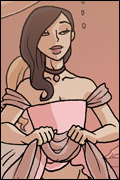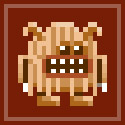|
quote:1) Come up with a new fourth category. This is preferred, but I can't think of any. Traps and Puzzles had to be folded together into Mechanisms, things like Trickery or Challenge are too vague and difficult to conceptualize. Maybe break Monsters into "Beasts" and "Villains" (or some other split - Monsters is a pretty big class)? Rival? Tournament? Treachery?
|
|
|
|

|
| # ? Apr 27, 2024 17:09 |
|
TheSoundNinja posted:Well, why not a "Meta" or "Cliché" type? It sounds like a medieval themed game, so why not make a suite that refers to classical tales from the time period? jmzero posted:Maybe break Monsters into "Beasts" and "Villains"? Right now, I'm thinking "Event". As in, something unexpected and external. For example, while a Crushing Ceiling would be a Mechanism, a Cave-In would be an Event. I still don't really like it, though. girl dick energy fucked around with this message at 19:13 on Jan 16, 2013 |
|
|
|
I have a rough idea for a card game. It's a superhero game. I'm unfamiliar with the multitude of superhero card games, please let me know if this idea has been done. Basic idea is for two or more teams of superheroes to have a brawl in the city streets that rapidly escalates. You lose if all of your heroes/villains are incapacitated at the same time. Otherwise, incapacitated dudes can get back in the fight. You win by being the last person not to lose. The game is played with multiple locations, with the first one being the street. Every game starts in the street. As the game goes on, effects cause new locations to come into play, separating heroes from their group as they're plowed through buildings. Whenever this happens, draw a location from the location deck, and it has special rules you follow. You can crash through as many walls as your table can hold cards. That said, the heroes themselves aren't really the focus. The situation is the focus. You don't make your guys take action directly. Instead, they have instructions on the cards that say what to do at the end of each turn based on the situation. For example if you have a Juggernaut kind of guy, if there is an enemy in the same location, he will always charge them, and he'll always move towards the closest enemy if there's no enemy on his location. Thus he's always doing damage but has a possible drawback. Ultimately the players are watching the fight and subtly altering it in their team's favor like some Olympian god rather than taking the role of the heroes/villains themselves. The only time the player really does something with their team is when there are mutually exclusive instructions to follow. Then they get to choose what their guy does. Players influence the game by playing cards that set up their team to do actions based on instructions on the card that interact with the type of hero they are. Say there's a card that's a Civilian In Distress. This card is played on a location and Self-Sacrificing or Virtuous heroes must attempt to resolve that card by landing on it, or suffer a penalty for the distraction. Players draw cards from various randomized decks, but the decks are all themed such that you have a pretty good idea of whether a deck will be good or bad for your team based on the types of cards that are there and the characteristics of your dudes. Decks are based on common stuff like Police activity, Civilian activity, or Escalation, which is stuff like a building falling down or the national guard showing up. I still need to think of more deck types. Not every character is incapacitated in the same way, but they are generally going to be incapacitated by a particular interaction between two or more characters, or by something like getting caught by the police. Someone could easily be incapacitated on the first turn since all characters on both teams will be in the same spot. Been done? This is by far an example of theme first mechanics second of course, taking a note on that running topic.
|
|
|
|
I really like the idea of your dudes being set on autopilot, and you just manipulate the situation around them, like gods watching (and betting on) a punch-up.
|
|
|
|
I like the idea, but I disagree with the statement that you "need to think of more decks." You need to think of fewer decks and a more elegant way of getting the same variety of outcomes. Having separate decks of cards for every aspect of the game is one of the features of old-school American (or "blockbuster") style design that I think it's 100% a good thing that we've moved away from... there are other things you could come up with which would both be more strategically interesting and probably more thematic too than just "decide which deck to draw from."
|
|
|
|
If you can ignore the annoying chipmunk voice, Penny Arcade's "Extra Credits" this week is a pretty good take on depth vs. complexity, though I don't fully agree with the terminology used. What he calls "complexity" is what I call "explicit complexity," and what he calls "elegance" is what I call "implicit complexity." Go is not a simple game, it's an (implicitly) complex game with simple rules. http://penny-arcade.com/patv/episode/depth-vs.-complexity
|
|
|
|
Colon V posted:1) Come up with a new fourth category. Here's a thought that might help. You could approach this from a different angle and say that instead of having types of obstacles, you group them by the way that they can be solved. Here's one way to group the skills that can used to overcome an obstacle (it looks a bit like a D&D character sheet):
Group these together into twos (the order above works, but it's not the only way) and you have four categories. Alternatively, you could use these as Types on the cards instead of having four fixed suits. That would let you have easier (three categories) and harder (one category) obstacles. And Magic could be a "Super" Type as you described before, applicable to any type of obstacle (note that although applying magic presumably requires Mental and Knowledge skills, overcoming it could require any one of these skills depending on what the magic was and what it was applied to, so there's no reason for it to be specifically tied to those types of obstacles). Tunga fucked around with this message at 10:08 on Jan 17, 2013 |
|
|
|
^^^ This is akin to a suggestion I was toying with, of moving away from a small number of broad categories and instead having a larger number of specific attributes, and giving each hazard two or three of them. I don't know quite how it would tie in with your mechanics, but you could even divide those into Threat (sort of like a Damage Type, i.e. how the thing hurts or thwarts the heroes) and Solution (or "Challenge" or something, i.e. what you need to beat it). So a Magic Lock might be Threat: Obstruction; Solution: Magic, Knowledge, while a Poisoned Arrow trap might be Threat: Physical, Poison; Solution: Agility, Perception. Maybe the distinction has to do with removing the threat... if you beat it by overcoming its threat, the hero is merely immune, but the Obstacle remains (e.g. beating a Magic Lock by immunity to Obstruction means you had a way to just walk through walls or whatever), whereas if you beat it via its solution, you remove it (e.g. beating it by Magic means your wizard dispelled it.) xopods fucked around with this message at 15:33 on Jan 17, 2013 |
|
|
|
Tunga posted:Here's a thought that might help. xopods posted:^^^ This is akin to a suggestion I was toying with, of moving away from a small number of broad categories and instead having a larger number of specific attributes, and giving each hazard two or three of them.
|
|
|
|
I've been designing a game where players go to work Mon - Fri and then on Sat they go out to dinner with their boss and try to impress him the most. "Work" on Monday through Friday is drawing a card off of a pile of one of 4 different categories representing projects this business is working on. At the end of the work week this categories are ranked in order of completion (smallest pile to largest pile) and in a random order they are brought up as topics of conversation at the dinner with players using single or combination of cards to come across as the most knowledgeable on these topics in order to gain respect points from their boss. This would continue over a few weeks/rounds until one player hit a respect point threshold. So the categories would give different amount of respect points based in the level of completion and then players would vie for them with the cards they played. I'm not set on how i want the cards to work, it needs the element of "display 3 knowledge of topic X" against another player's "display 2 knowledge of topic X" with the higher amount winning more VPs/respect points. I would like to make it a bit more involved and interactive than that though with some elements of conversation that have differing effects. Stuff like tell a joke, reference something personal, defer conversation to someone else, etc. I don't think a deck of 100 different cards is the way to go, Im leaning towards requiring multiple cards being played by a player for a combined effect. I toyed around with a system akin to Epic Spell Wars where players would play a Topic, a Tone, and a Level of Knowledge card together to various effects. But I just can't shake the fact that a similar cars interplay in my game would be scaled down a bit from Epic Spell Wars so why make an inferior version of an existing game. I'm more liking each card being two things, the topic of conversation and then on the edge it has some sort of modifier or effect. Basically you'd play a category topic card and the other card partially underneath that would have a various effect on the main card played. I have a few more elements I'd like to involve, for one each day players would have the option to either work overtime and draw an additional card or to rest and discard a card from their hand. But first I want a good system for actually conducting the conversations, I thought I might get some suggestions here. Edit- I apologize for the abhorrent spelling and formatting, posting from a tablet while I'm waiting on someone, I swear English is my first language! Admin Understudy fucked around with this message at 19:14 on Jan 17, 2013 |
|
|
|
Admin Understudy posted:Im leaning towards requiring multiple cards being played by a player for a combined effect. I toyed around with a system akin to Epic Spell Wars where players would play a Topic, a Tone, and a Level of Knowledge card together to various effects. But I just can't shake the fact that a similar cars interplay in my game would be scaled down a bit from Epic Spell Wars so why make an inferior version of an existing game. I'm more liking each card being two things, the topic of conversation and then on the edge it has some sort of modifier or effect. Basically you'd play a category topic card and the other card partially underneath that would have a various effect on the main card played. I think that it is pretty tough to determine a system for this because abstractly representing conversations is rarely done (as opposed to combat or trading) so there are no default answers. I do have a couple of quick thoughts though. First, how are you going to represent 'the boss'? Are you planning on having a player in the position or is this going to be an AI thing? -- because both could change the strategies available and the required components quite dramatically. Option 1 Assuming that the 'boss' is not player controlled, one suggestion is that you could just 'adapt' the standard fantasy fighting system (like Epic Spell Wars) into a conversational format -- so every player and the boss has a set of HP and conversations are all about doing 'damage'. The advantage of this system is that it is pretty well trodden ground and intuitively anyone who has played D&D or any RPG video game is going to have a pretty intuitive view of how this works. Once you have made this decision, it is pretty easy to see how your mechanics would develop... You could start spicing this up a little bit -- instead of counting down HP, each player has an 'interest level' for the boss that counts up. Each different 'boss' has a different interest in one of the four projects making him 'weak' to playing cards of this sort (adding extra 'interest' (ie. damage) and an area that he is uninterested in making him 'strong' against topics of this sort. Possibly an attempt to find out the bosses weakness would be an action during the work week which would take away from drawing cards. In addition, rather than focusing on increasing the bosses interest rate in you, workers could spend the week gathering 'modifiers' that hamper or 'attack' the other players. Maybe everyone has a 'Apparent competence level' (ie. HP) and the modifiers might allow you to damage that. If they fall below 0 they are out of the conversation. Other potential modifiers would be slowing others players ('long anecdote'), stealing their cards('taking credit'), weakening the card they played('underhanded insult'), modifying the 'topic' of your card ('really selling it'), possibly even changing the boss' weakness 'refocusing our efforts', etc. The boss could even 'attack' periodically, asking a demanding question of the players and decreasing the player's competence levels (and potentially eliminating them) unless they play an appropriate topic in defense. So, do you seek information on the boss... seek to build a specialized hand... seek to diversify... or work on gimmicky abilities that help you and hamper your opponents. It basically writes itself! The problem being that this, perhaps because of its ease of use and familiarity, isn't the most exciting thing in the world and you have to do some work before its strategy becomes interesting. Just because it uses similar mechanics to other games though doesn't mean that it has to be the same game. The devil is really in the details. I would aim for quick with a press your luck feel -- something like a slightly more complicated, card based King of Tokyo rather than the very random Epic Spell Wars. Option 2 You could pattern it after a trick taking game... say 'Hearts' (except that you are trying to win tricks rather than lose). So, say, each round against the 'boss' there is a different random project (out of the four) that is his or her trump card. This could be peeked at instead of drawing new cards or discarding old cards. The player who is losing lays down a card, based on the project of his choice... players must follow and play topics of that 'suite', play a card of the same value but differing topic (which changes the conversation and other players have to follow them) -- if they can do neither of those then they can either play a trump card (which changes the conversation and everyone has to follow) or discard a card. If everyone is forced to discard a card, the last player to play gets a victory point. This works best with ways to increase your knowledge of other people's hands (and a set number of basic cards). The modifier cards are a little trickier here but could include things like looking at other player's cards, stealing random cards from them, forcing them to display a card of X value or pass the hand, looking at the next trump card, inflating your card value (up or down), changing the suite of a card played, etc. If you do this, I suspect that you will want to get rid of the four piles and have a draft mechanic (everyone gets a card of 6 cards at the start of the work week, picks two and passes the remainder to his or her right). You could also 'work overtime' (discard one card and draw a random card from the deck) or 'rest' (discard a card and take one from the discard). Both of those are pretty rough though and I am sure you can do better!
|
|
|
|
So, I am continuing to work on polishing my September contest entry, Dictator, and I have hit a bit of snag (I can provide the full rules if anyone is so interested or if this is not clear). The basic rundown is that players are attempting to compete against each other for Victory points... while simultaneously trying to fend off a number of threats. If the threats win, then everybody loses, but if not then the player with the highest total of VP wins at the end of the game. Each player has a hand of 6 numbered cards from four suites (refilled each turn). Each turn a player is also assigned one threat. Threats are defeated by playing cards of the same suite up to a certain value (so, if it is a 'Wealth' threat then you have to play 'Wealth' card totaling 7 or more). If the player is successful, they gain a VP. Each player normally doesn't have enough cards to deal with the threat themselves, so they have to make deals with other players -- everyone who is interested in contributing places cards face down in front of the player. These are shuffled and then revealed. If the others have played the correct suite then the contributing cards add to the original player's total... if they placed an opposed suite (say 'Honor' is opposed to wealth), then it subtracts. The idea was that, since it is anonymous, people would backstab and cause people to fail (so that they don't get victory points). Here's the problem though: none of my playtesters ever used this mechanic and I am no 100% sure why. One possibility is that my group is just too cooperative (but this seemed to be an issue in the contest as well). The other difficulty that I see is this -- since the same resources which could be used to screw people over are also used for a myriad of positive reasons -- to defeat your own threat and gain VP or to help someone that helped you -- the optimal strategy seems to suggest never screwing anyone over. This is compounded by the fact that if too many threats are failed then the game is over for everyone. Can anyone think of ways to fix this and encourage a little more backstabbing? Some quick solutions that I have thought of are 'goal cards' (either hidden or revealed) that encourage and reward offensive card use (something like first player to cause another player to fail gets +1 VP) but the anonymous nature of the card reveal makes this complicated. I also have, more generally considered rewarding everyone who contributes to another player's threat (backstabbing or not) gets to draw one new card -- but this makes the wheeling and dealing much less interesting since the hand is no longer a dwindling resource. So... I am stumped!
|
|
|
|
The best solution I can think of would radically change your game. One or more players might end up being a "traitor", whose goal is the downfall of the others. If you've played Chrononauts, think Crazy Joe. He wins in everyone else's all-lose. Everyone would get some kind of goal, that blurs the lines. Or, if you don't want to go that extreme, you could have one where they all give some kind of tangible reward, and one of them is having X other players lose Y rounds, so they're motivated to make others lose, but not so much that everyone loses. girl dick energy fucked around with this message at 04:52 on Jan 21, 2013 |
|
|
|
DirkGently posted:Here's the problem though: none of my playtesters ever used this mechanic and I am no 100% sure why. One possibility is that my group is just too cooperative (but this seemed to be an issue in the contest as well). The other difficulty that I see is this -- since the same resources which could be used to screw people over are also used for a myriad of positive reasons -- to defeat your own threat and gain VP or to help someone that helped you -- the optimal strategy seems to suggest never screwing anyone over. This is compounded by the fact that if too many threats are failed then the game is over for everyone. There's a few routes you could take... Maybe instead of threats that affect everyone, there could be individual threats that you need help to overcome. The person helping you would gain a reward for doing so, or everyone could band against you and intentionally let you fail even if that means giving up the the reward. (This is similar to Munchkin, although I think Munchkin also has a major problem - it's pretty much a cooperative game until someone is close to winning, then it's all about dogpiling on that person. It's funny with the right group but it's not really very political.) Or, the traitor element. But instead of determining the traitor straight off the bat, traitors could be randomly chosen midway through the game. However, no one knows when it happens, if even happens, or how many traitors there are (except the traitor(s) of course). And if there are multiple traitors, they might have different goals and routes to victory. As Colon V said, though, these would radically change your game. As it is right now, it sounds very simple, and you'd have to introduce a lot more mechanics and elements to make my suggestions work. Rotten Red Rod fucked around with this message at 17:54 on Jan 22, 2013 |
|
|
|
Edit: Stuff that doesn't belong here.
syntaxfunction fucked around with this message at 10:37 on Jan 23, 2013 |
|
|
|
If you're making an RPG there's an RPG Design Thread here which might get you better answers.
|
|
|
|
Tunga posted:If you're making an RPG there's an RPG Design Thread here which might get you better answers. I am an idiot that didn't go past page two Thanks.
|
|
|
|
I kind of want to design an Inception game.. anyone else want to tool around with the concept with me sometime? I realize there is already a fan-made card game, but it's only very very loosely related to the film and concepts. I'd want to make a game with a board and mechanisms for hiding which level of dreams your in. Shammypants fucked around with this message at 16:27 on Jan 25, 2013 |
|
|
|
My publisher says Cash or Crash is going to be out in the U.S. sometime in the next couple of months. If I can get at least four or five (up to eight) people interested, I'll do a PbP here to promote it. I posted about in the Board Games thread and got two takers so far. Anyone here interested? (PM me if you have PMs, otherwise you can just respond here, even though it's somewhat off-topic.) It's a bluffing game, in the same vein as Liar's Dice, but with more tactical options and less luck. EDIT: Full, but if anyone else is interested let me know and I'll see if there's enough interest to start a second. xopods fucked around with this message at 05:29 on Jan 26, 2013 |
|
|
|
I'm working on an idea for a new bluffing game... a little bit of poker crossed with Stratego or something. The basic idea is that each player has a deck they're drawing from which contains cards with 1, 2 or 3 footmen on it, or a general who has no intrinsic power but boosts any footmen accompanying him (maybe +1 to each, or doubles them). Then there are small boards with locations to fight over, which give you some combination of victory points and extra card drawing power (the ones which give you more VP give fewer cards and vice versa). When a player owns a location, he'll have some cards there, which might be face up, face down, or a mix. On a player's turn, after drawing whatever cards he earns from locations he controls, he can either Withdraw all cards from a location back to his hand, or he can play cards from his hand to Attack a location controlled by an opponent. He plays these cards face down. The defender can then Retreat, Reinforce or Stand. If the defender Retreats, he returns all cards from the location to his hand and cedes control to the Attacker. All the attacker's cards remain at the location, face down, except the most powerful card among them, which the Attacker must flip face up (the retreating army got a glance at the attacking one, and some idea of its strength). If the defender Reinforces, he adds one or more cards from his hand to his side of the location, face down, and the role of attacker and defender are reversed - the original attacker may now commit more cards, retreat (forcing the former Defender to reveal the strongest of his formerly face-down cards), or stand. When someone Stands, all the cards are revealed, and a victor is determined. The player who makes the Stand wins ties. Loser's cards are discarded and the winner now controls the location, though his cards all remain face up. (I may have to introduce some form of compensation for a player who loses a huge number of cards in one battle, to avoid effective elimination problems.) To win, you have to control a certain number of VP at the beginning of your turn. In a two player game, you play with two identical boards, probably with the following locations: 0 VP / Draw 3 - Keep 2 1 VP / Draw 2 - Keep 1 2 VP / Draw 1 3 VP / Draw 0 (The draws are cumulative, so if you had one of each type of location, you'd draw 6, keep 4). In a 3+ player game, you play with one board between you and each of your neighbors, so you're only fighting over locations with the people on either side. For 4 players it could be a team game, with partners playing opposite each other. I'm not sure whether to resolve each battle within a single turn, or whether the build-up of forces should be allowed to progress over the course of many turns... I think the latter's more interesting, if it works. So on your turn, you'd first check for any of your locations at which a battle is taking place, i.e. where both your troops and the enemy's are present. For each of those, you make your Retreat, Reinforce or Stand decision. After that, you get your one Withdraw or Attack action. Possibly with the caveat that you can't immediately attack a site you've just Retreated from. Or maybe it should be in the other order, so you could Withdraw troops from one site to Reinforce an important battle at another.
|
|
|
|
This is more of a business question, but it's very closely related to how I want to get my games (any myself) out there. Is there a point where I, as a designer, should be looking into becoming a business? My current gameplan is as follows, finish Ghosts of Whixly Manor and Super Robot Fighter before the end of March, while at the same time setting up a website and offering some PnP versions of older games, as well as some RPG design projects I'm doing, for a Pay-What-You-Want donation. I intend to use this platform to attract some followers, use my Social Media know-how and continue trying to get published through one of the smaller indie publishers. My only concern is some horrible IRS scenario where I take in too much donation and get sent to white-collar prison for Board Game Design gently caress ups. Any advice, thread? Also, if anyone would like to read over the draft/cards for Super Robot Fighter and Ghosts Of Whixly Manor, let me know, I'm working on Google Drive and love having more comments.
|
|
|
|
I really don't know much about US tax law, being a canuck, but I'm a game designer, and a freelance artist/writer/programmer, and haven't yet hit the point where it would make much sense for me to incorporate. I do a lot of my work under the trade name Bene Factum, which technically I should register in order to protect it, but I haven't even bothered with that. I know the IRS can be pretty aggressive about things compared to other countries' tax agencies, but surely for stuff like donations to your self-employment business, there are ways to just declare it on your personal tax forms without having to go through all the headaches associated with running a corporation.
|
|
|
|
If you're that worried, it'd be much, much easier to just hire an accountant than to become a corporation.
|
|
|
|
I am not a lawyer. That said, if you find yourself needing to enter into contracts with other entities it makes alot of sense to start an LLC. Don't do a sole properitership. You also don't need a C-corp. The LLC will do what it says on the tin (e.g.; limit your liability) so if things go tits up and you get sued it's the company being sued with the company's assets not your own personal ones.
|
|
|
|
You might want to ask the Legal Question Megathread, they could probably tell you the best way to handle it. --- Unrelatedly, I was thinking on ideas for my games, and I came to a realization of what I dislike about tile-based games. Generally speaking, there's no meaningful decisions to be made about what tiles are flipped, or how they're placed. The tiles just happen at you, whether it's good or bad, and that's about it. So I got to thinking about ways to change that. The idea I hit upon was to have different "difficulties" of tiles available. So, while you may not have a perfect choice, it's at least something. Risk/reward management. Slowly, an idea for a game settled in my head. A game about greed, about ignoring the risks, and going deeper and deeper despite the risks until it blows up in your face, or staying where it's safe, but watching your opponents get very rich very quickly. I knew there was only one theme that would work for this game. And that's how I started on the game that's currently stealing all my free "design time" and ideas, working title Dig Too Deep. All the ideas are exceptionally malleable at this point, except those previously discussed. But, so far, here's how I'm thinking it'll work. I'll note going in ahead of time that, yes, I took some pretty heavy inspiration from Dwarf Fortress. --- The game plays for 1-4 players, with even numbers preferable, and solitaire rules not quite worked out yet. The game board is dominated by a single, solitary peak, the Ornery Mountain. In the center of the mountain lies a vein of the rarest and most valuable material known to dwarfkind, Greedium. Each player controls a small mining company, consisting of four(?) dwarves, each making an attempt at the Ornery Mountain as a last desperation move before they go completely bankrupt. Their company is unfortunate very poorly-supplied and even less-skilled, and arrives with nothing but a couple of rusty picks, moldy rations, and some gumption. It's the player's goal to get as rich as possible, while also keeping their dwarves fed, supplied, healthy, and armed, as the deeper into the mountain you go, the more dangerous the denizens get. Dwarves can be placed in the farms, to make more food, or in the workshop, to make new tools and weapons, travel to a nearby town to trade their wares (for food, tools and weapons), or take care of another, injured dwarf. The 'main' action of the game, however, is to have a dwarf dig out a mountain tile. It's flipped over. If it's a resource, it's added to the player's stock. If it's a monster, it terrorizes your dwarves until it's defeated. You then use the resources you got to trade for more, make better equipment, collect VP, and other such things. Either at the end of a certain number of rounds, or 'first person to reach X VP', the game ends. --- That's the core of it. At the moment, I'm considering doing some sort of small-tile thing, not unlike how a lot of 4X games work, except on a smaller scale. Well, there's the problem. With the 'mountain' how I've got it now, I'm looking at at least 128 little chits, just asking for someone to bump the table, or have an errant sleeve or, heaven forbid, cat come and completely wreck everything. The only solution I can think of, besides "deal with it" or reducing the complexity of the mountain map is that sort of plastic forced-grid that good Scrabble boards have. Unfortunately, I can't think of any way that doing that wouldn't cause the theoretical production price for the game to skyrocket. All ~130 tiles would have to be done in plastic, and colored, for them to work with a scrabble-type grid without getting clawed to oblivion in three or four plays, and that would be prohibitively expensive, even if I somehow managed to get minimalist enough to fit all the designs on scrabble-sized tiles. So, here are my options, as I see them. 1. Keep everything as-is: Either deal with tiny, bump-prone cardboard pieces, scale everything up for better weight, but a horrible table-dominator of a game, or just accept that this is not a game that I will ever be able to afford to make a physical prototype of, much less sell. 2. Find some way to simplify the mountain, without oversimplifying the game as a result. Maybe go from Scrabble-sized tiles to Carcasonne-sized ones... somehow. 3. Discard the tiles entirely, and abstract the mountain with cards or something. My order of preference right now is 2, 1, 3, with each about an order of magnitude more 'ideal' than the previous, but I can't for the life of me figure out how to simplify the mountain, while still keeping it reasonably complex enough to suit a worker-placement game. So, um... help?
|
|
|
|
I've got two tile laying games I'm slowly prototyping and i know what you man about them having inherent faults; one of them, sure, is my "first game" idea where the inherent unpredictability is thematically appropriate (it's a racing game based off Wacky Racez) but the other has the same problems you're talking about. With the added bonus that the tiles are five sided, so no matter how I lay them on a sheet, there is a lot of wasted cardboard. My suggestion is to rethink the shape of the tiles. If you're using squares, make them bigger, and turn them into isosceles triangles, like Triominos pieces. If you can, of course. They should hold themselves together easier than a square grid, and the unique shape should make them more memorable.
|
|
|
|
Tiles are kind of a design pain, yes. At least you know exactly what shape your final setup will have, so you can plan accordingly. How much table space do you want to take up? If you take up, say, 2' by 2', then that gives you tiles that are 1.5" on a side, which is probably plenty if they only have a single piece of info on them. One idea to make things stay together better: make the pieces interlocking. You could start with a preconstructed border area, and then draw tiles from stacks and add them to the map, working in. You could even have a sheet underneath the play area that's color coded, so you can easily tell what color tile goes in each new space.
|
|
|
|
My question is what purpose do the tiles actually serve? Based on your description it sounds as though it could easily be abstracted to a card format without losing anything other than the "neat" factor of a tile layout. You're right in that your proposed setup would be a setup and production headache.
|
|
|
|
You could make the tiles larger and put multiple "spaces" on a single tile. E.g. instead of 128 tiles, you have 32, with four of your former tiles now printed on each (in a 2x2 grid). Of course, adding four spaces to the map in every flip will likely require some changes to your mechanics, but you're not that far into the design process, so now is the time to make that kind of change.
|
|
|
|
Hm... I think I'm gonna try doing something that incorporates several if the ideas. Instead of 'harvesting' tiles, you'll place larger, interlocking tiles representing mineshafts, and draw cards for what you dig out.
|
|
|
|
I cleaned up the 2nd post (with web resources for game designers) a little bit. If anyone has any links that they think should be included, but aren't, let me know.
|
|
|
|
Is it cool if we link to our own sites and stuff here? I'm just starting to open my own website for my designs and work. I want to have a big section on games design and have helpful advice and links on there too, right now its basically a longer, more difficult to read version of the OP+Second Post. Hoping that having a website and cultivating a small following, it might be easier to attract publishers attention. I'll also be offering PnP downloads for games that have been rejected or games that I've put aside. Either way, is this a good idea? I figured artists and the like have portfolio websites showing off their stuff, and that apparently helps attract attention and an air of legitimacy, and I've seen a couple people doing similar things (Sun Tzu Games) to great effect.
|
|
|
|
I'd say yes. I've mentioned my own games and site several times. Like it says in the OP, although I don't want people showing up here just to plug a site or a product and then disappearing, but I think it's fine for regular contributors to plug their stuff within reason. After all, this isn't just a thread about designing games for the fun of it - it's explicitly about all aspects of being a game designer, whether as an amateur, semiprofessional or professional. It wouldn't make sense for people to talk about their games while they're being developed and then suddenly not be allowed to talk about one once it got published. (Speaking of which, I might do a post-mortem for Sultans of Karaya at some point... that might be helpful for people.) Anyway, drop the link and maybe I'll add a separate section to the OP for the sites of thread contributors, so at least we're being up-front about which sites are being recommended by third parties and which are being plugged by their owners.
|
|
|
|
Alrighty - http://sandypuggames.com/ Things are still settling, I have some more artwork incoming for some of the pages but I think it looks pretty good right now. I'm especially proud of the insane logo I've settled on. Should have another playtest for my robot fighting game soon, and I'm hoping to have it finished with Whixly in Playtest by the end of the month. A friend of mine has recently shown interest in games design, and he has some ideas that he mentioned he wanted to 'pitch' to me. It feels really weird being seen as an actual designer with like, authority on the matter, when all I have to show is 3 half finished, unpublished games. It's neat though, and I think collaboration would be good. Does anyone have any experience co-designing games?
|
|
|
|
I'm not much of a team player, but there are certainly games out there that have two designers listed. I would assume that having very similar taste in games would be a prerequisite, so you don't end up with a game that's trying to do to things at once and working against itself. However, from the sounds of it, I feel a warning is in order. As soon as you establish yourself as someone who does anything creative and fun, whether it's writing stories, drawing comics, designing games, computer programming, etc., you'll find that people come out of the woodwork wanting to "pitch" you their "great" ideas so that you can work on them "together." Almost every time, this turns out to be someone who doesn't buy the "1% inspiration, 99% perspiration" rule, and thinks he's already done half the work by coming up with his great idea and just needs someone to do "the rest." The rest being essentially everything. If you're going to collaborate with someone, try to make it someone who's actually done some stuff on their own, first. Otherwise I can almost guarantee you that any joint effort will in fact just be your effort, with him hovering over your shoulder offering "helpful" advice about how what you're doing isn't exactly the way he imagined it and it would be better if it was.
|
|
|
|
My major in uni was very focused on group work. I'm totally with you on that point. I get people coming up to me literally all the god drat time with such incredible advice as 'Well you should do x!' or 'Why Not Kickstarter!!!' and I make a point to smile and nod then walk away quickly. This guy is pretty together though. Fairly accomplished in his own projects and he's helped me plenty with my works in the past. Your post just made me flashback to the uni years and how my final project was supposed to be split between 5 people and ended up being me and one other guy working for 9 hours a day in a small computer room for weeks on end. One interesting sidenote here though, is it's interesting how game design is simultaneously a very creative and very non-creative venture. It's a lot like programming in that you're still making A Thing from nothing, but it's not a readily accepted Creative Form.
|
|
|
|
Okay, if you think he's going to pull his weight, go for it. I have nothing to go on about this guy specifically, only personal experience with other people... At least with computer programming, people understand that there are technical skills involved, and that it's real work. Any sort of visual art is slightly more problematic, in that people understand that you can draw and they can't, but they think drawing must be pure fun for you and couldn't possibly feel like work. Game design is worse still, in that everyone seems to think it both requires no skills, only ideas, and is nothing but fun the whole way... so they don't get why you don't drop everything and run off to make their awesome game for them when they're gracious enough to provide you with such a valuable idea, asking for nothing but credit in return. 
|
|
|
|
xopods posted:Okay, if you think he's going to pull his weight, go for it. I have nothing to go on about this guy specifically, only personal experience with other people... This. A million times, this. My wife is a painter and has gotten roped into doing some work for other people's projects. She fell into that trap that you mentioned, as it turned out the people she was collaborating with had done very little in the first place. She held up her end of the bargain and took a lot of her own time putting art assets together (for dice-and-paper RPG books), and because the other folks only had that initial spark and not enough perseverance to finish, it never got off the ground. Visual arts get a lot of this, I think, because it's a skill that a lot of people know right away that they don't have. Writing is a skill that people are bad at in equal numbers, but a lot of people just don't realize it with quite the same "thud" as with visual arts. A lovely drawing is obvious form first glance. A lovely piece of writing usually isn't as obvious. That said, if you can find a collaborator who is on the same wavelength in terms of work ethic and interest, it can be fantastic. I, as someone with absolutely no visual art skills, am happy to have a wife who is a gamer and is willing to work with me. I feel our work is greater than the sum of its parts.
|
|
|
|
quote:That said, if you can find a collaborator who is on the same wavelength in terms of work ethic and interest, it can be fantastic. My new rule for collaborators/artists/whatever is something like this: "I'm running the project and get final say in everything. This is because I'm paying you money for your work - and that money is all I can guarantee. I'm going to do whatever I want - including, possibly, get bored of this project and bury it." I've gotten tangled up in hazy collaboration stuff before where visions drifted and motivations waned and feelings got hurt. I've never had anything really blow up or something, but it takes the fun out of things. Paying money means I'm paying money, but it sure makes things simpler and more pleasant. VVV: My relationships with the people still tend to feel collaborative. On my current video game project, I've given the artist very little direction and he's pretty much just drawing whatever characters and bits he feels like (he has a good sense for the type of game and what kind of stuff will probably work). But the fact that, yeah, deep down, it's not actually a collaboration is very liberating. jmzero fucked around with this message at 21:54 on Feb 6, 2013 |
|
|
|

|
| # ? Apr 27, 2024 17:09 |
|
jmzero posted:My new rule for collaborators/artists/whatever is something like this: "I'm running the project and get final say in everything. This is because I'm paying you money for your work - and that money is all I can guarantee. I'm going to do whatever I want - including, possibly, get bored of this project and bury it." I wouldn't really call contract work "collaboration," though. I do tons of contract work, mostly as a writer or an artist, and that's always very successful... whereas none of my efforts to collaborate on a project (usually a digital game) ever panned out. Inevitably, someone would flake out, usually the other guy... once it was me, maybe a couple you could say were mutual. I think game theory actually has something to say about collaboration, namely that it doesn't only fail due to difference in opinion, but also due to never being sure that the other guy is working quite as hard as you. You could construct a toy game to understand why it often doesn't work, especially for larger projects: Collaboration - a game of mistrust and disappointment (1) The game is played by two people over N periods. The materials are an opaque bag, and a number of tokens for each player. (2) The players payouts' at the end of the game equal their profit (or loss) in tokens. (3) At each period, each player secretly decides whether or not to put a token into the bag. Nature then either does nothing or adds one token to the bag from an outside supply, with 50/50 probability. (4) After every X periods (X < N), the bag is opened and both players can see how many tokens are contained therein. (5) If ever there is a period in which neither player adds a token to the bag, the game ends immediately and neither player receives any of the tokens from the bag. (6) If the players successfully make it through N periods without the game ending, then the tokens in the bag are split evenly between the players. xopods fucked around with this message at 21:37 on Feb 6, 2013 |
|
|


















